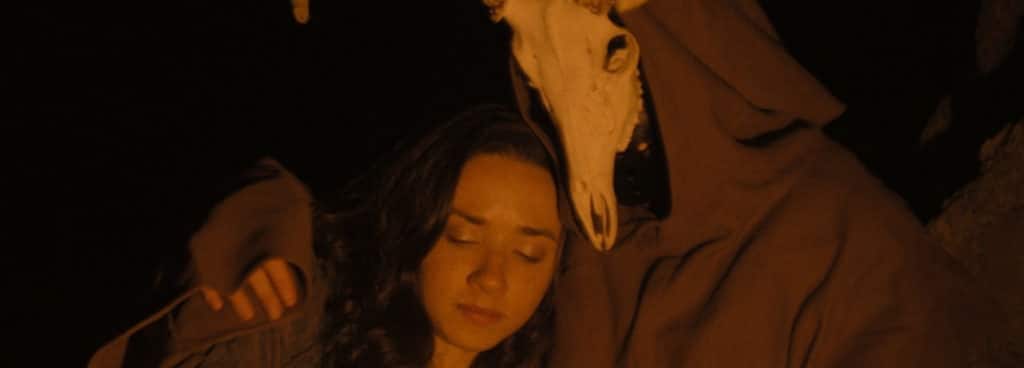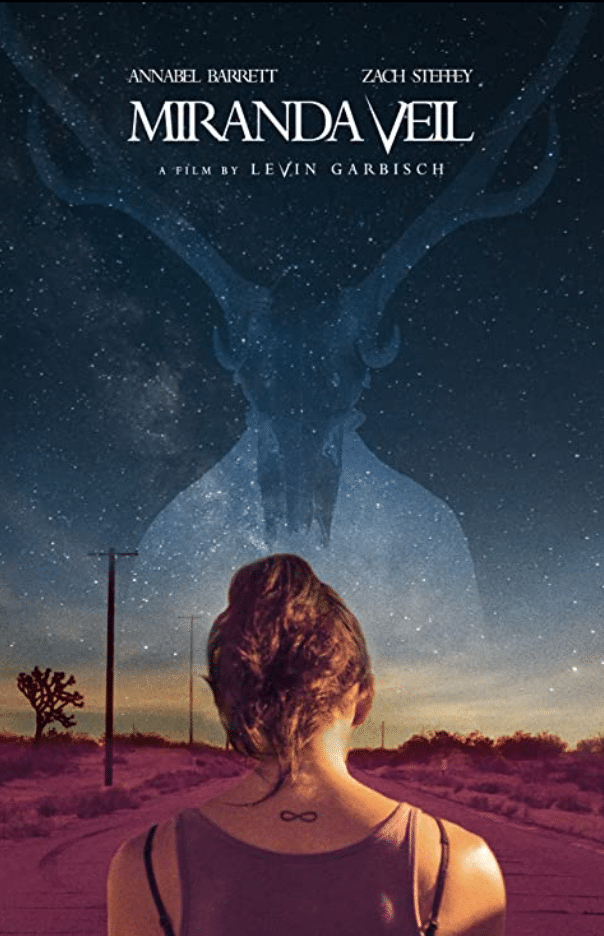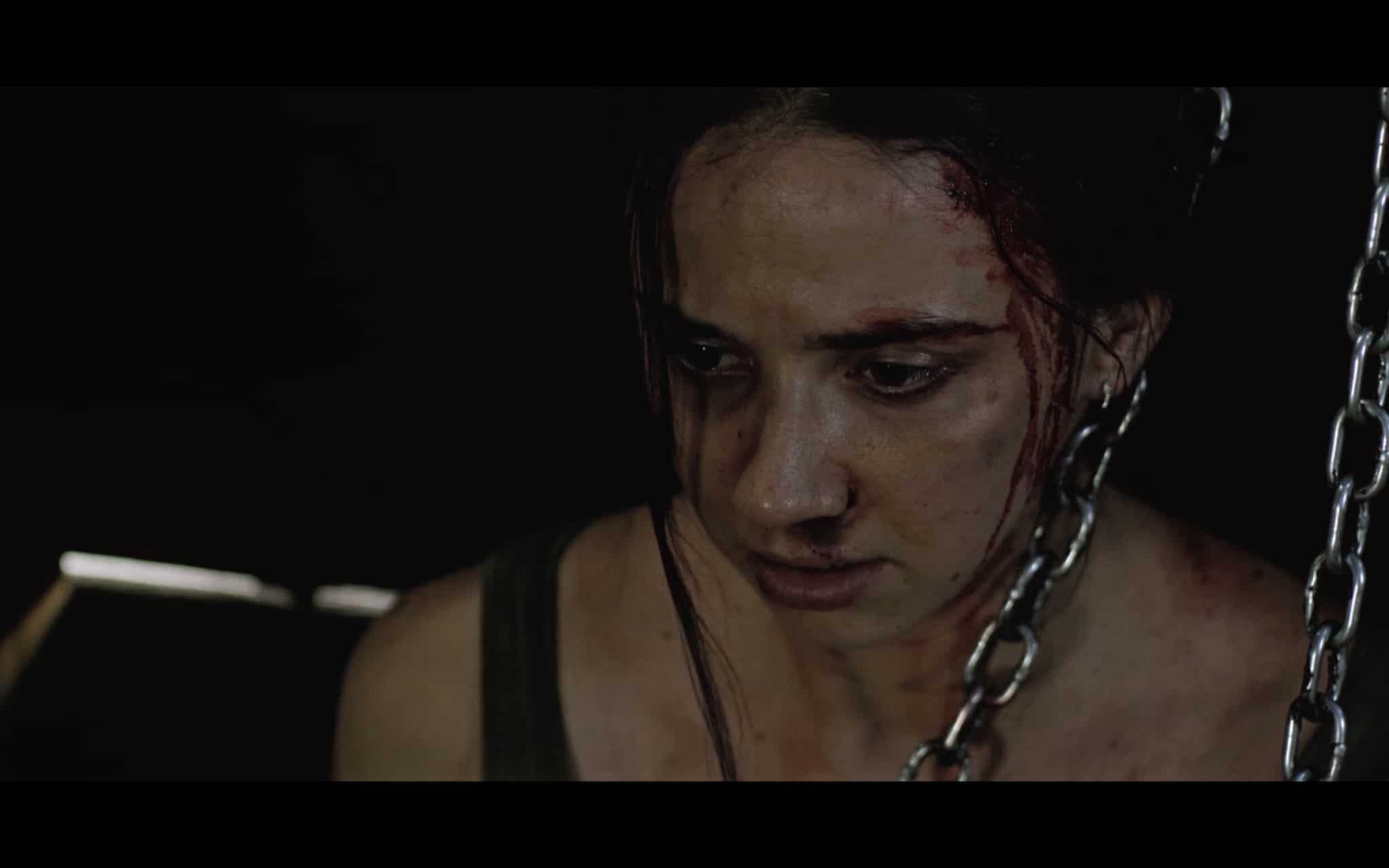
Can we really go anywhere new with the whole guy meets girl, guy kidnaps girl, guy tortures girl horribly thing? Apparently, yes we can. Miranda Veil (2020) has a savvy idea which puts an original spin on some oh-so recognisable elements, shifting its emphasis and focus as it goes. It’s not without a few lesser issues, but overall there is a lot to appreciate here.
As suggested, we start in familiar territory: a would-be serial killer, Soren (Zach Steffey) has confined a blindfolded and bound woman in an isolated location, and he’s debating with an unseen voice about whether or not to go through with the deed (the ‘voice of evil’ in films always sounds pretty similar, no? It’s like having a moral debate with Jesse Ventura.) Anyway, Soren turns out to be a bit of a stickler on the whole savage killing thing: he wants it to mean something, needs some kind of connection with his victim. Accordingly, he decides he can’t go through with it and instead of dispatching the young woman, ditches her on the roadside, fielding bitter recriminations from ‘the voice’ as he flees. Here’s where we first encounter Miranda (Annabel Barrett), a young woman just reaching legal US drinking age and enjoying a legally-hungover weekend to celebrate. It seems Soren has been doing his research on the available young women of Barstow, CA, and Miranda just might be the one he’s looking for. He therefore takes her captive, retreating to the same isolated barn as before.
At this point, the film might have just resigned itself to being another ‘woman tied up and menaced with tools and so on’ – something which would have probably led me to switch it off, honestly. But when Soren finally reaches a decision on whether or not to make his first kill, there’s a snag. This is hinted at from the outset, where it seems Miranda has an unusually high pain threshold; Soren’s attempts to intimidate and harm her result in annoyance on her part, rather than genuine fear. Even Miranda notices the fact that her protestations are more about convention than really feeling and responding to pain. As far as it goes for Soren, though, it gets worse. It seems that Miranda won’t die. Whatever he does, she simply snaps back into life, getting progressively more confused and exasperated when she does: this is kind of a surprise to her as well. For an aspiring murderer, this couldn’t be any worse. What’s a guy to do?

The first hour or so of this film was a genuinely unexpected pleasure. Clearly, writer and director Levin Garbisch has a good awareness of the horror genre but wants to expand it, rather than just respect its confines. Hence we have a hell of a lot of tropes here, but the film is self-referential, confident enough to play around with those tropes and take them in interesting directions. Miranda is no mute victim; rather, she grows into a pleasantly proactive character, and the interplay between her and Soren is engaging, using dialogue to push things about as far as possible whilst remaining within the bounds of acceptability. Miranda Veil knows where it fits in as a boundary-pushing horror film, too, referring openly to other horror franchises and even stepping outside itself to poke fun at horror, in a similar way to Scream (though shorn of the high levels of gore – on a budget of approximately $50,000, there’s only so much you can do, even if you want to do it.)
Accordingly, the film doesn’t stick solely with the premise of being unable to die as a means to explore increasingly grisly attempts at it, and morphs into something far more …philosophical? There are elements of early Kevin Smith movies here via an array of oddball characters which interweave with the main story, and even a little Fear and Loathing, too: well, this is set in the very same Barstow where “the drugs began to take hold” for Duke and Gonzo. There’s a certain hitchhiker scene which really seems to reference the novella. In terms of how this all works on screen, I understand why the film heads in this direction – of course being unable to die would prompt a bit of soul searching – but things do meander from the hour mark, and as the film is around 1 hour 45 altogether, it could have withstood a hard edit, as it does lose some of its initial impetus. The perils of making an indie film, I guess – it becomes your baby and it’s hard to make decisions which cut your screen time. But Miranda Veil still works for me: it comes together for a suitably left-field conclusion, leaving an overall impression of a film which is very smart, often pithy and on the whole, very inventive.
